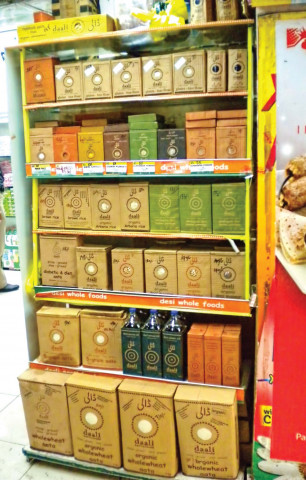Entrepreneurs nurture market for organic foods
Daali and Panjeeri offer alternative to food treated with harmful chemicals.

Alarmed at the thought that the produce she was buying from the local markets had been grown in sewage water and treated heavily with pesticides, Sabir sought an alternative. She found it at Panjeeri, a store selling organic foods.
“I get seasonal vegetables, organic chicken and eggs there,” says Sabir. She buys spices, whole grains and brown sugar made by Daali, an organic food manufacturer.
Daali and Panjeeri, founded by friends Marium Abrar and Samia Mumtaz, offer the health conscious an alternative to food grown using chemicals and dirty water. Their businesses have tapped into a growing market for organic food.
They started out in 2005 by setting up Daali Earthfoods, a small store in Mini Market. Initially they made and sold only a few kinds of flour, made using various grains and honey. “It was a hard market to break into because the idea of consuming organic products did not really exist,” Abrar says.
But they soon started expanding their product range as well as their reach, convincing managers at Al Fatah and Jalal Sons to carry Daali products. Daali Earthfood eventually established a clientele of middle-aged women, people like Sabir aware of the health benefits of organic food.
Many of their customers were elderly people told by their doctors to eat less-processed foods. “They tend to be more health conscious,” Abrar says. The top seller is gluten-free and diet flour, recommended to people with blood pressure and heart problems.
As the business grew, Abrar and Mumtaz started concentrating on different areas. Eventually in October 2008, Abrar bought out Mumtaz’s share in Daali Earthfoods the manufacturer, introduced new products like rock salt and brown rice, and sought out more stores to place her goods in.
The latter, meanwhile, took over the Mini Market store, renamed it Panjeeri and added a host of other organic products, from herbal cosmetics to organic cotton.
“The idea was to diversify the product range by engaging more suppliers,” says Mumtaz, as she visits the shop to hear complaints or answer questions from customers. She is always on the look out for good-quality home produce, preferably organic, to sell at her shop.
Apart from Daali products, the store is stocked with body scrubs, soaps, natural scents, herbal serums, cottage cheese, a variety of breads, and meat and dairy goods. A baked goods section offers oatmeal cookies, carrot, apple, date and walnut cakes, and quiches.
But the top sellers are basic products like organic eggs, chicken, milk and homemade kheer, says Maqsood, a store employee for over four years, as a regular customer’s driver arrives to pick up a package of groceries.
Daali
At a small two-room workstation, two Daali employees grind wheat grain in special mortars made of Jaipuri stone. It is a tedious and arduous process.
The two workers take up to eight hours to grind 40 kg of wheat.
“Having to do these things manually rather than in a machine obviously raises costs,” says Abrar. “Using an electric grinder, you can do a 40-kg bag in 12 minutes.”
She insists that every step in the preparation of Daali products is “100 per cent organic”. Instead of spraying chemical insecticide on her crops near Bedian, workers use banana leaves to sprinkle them with a brew of garlic and neem (lime) leaves boiled in water.
Daali Earthfoods supplies seven kinds of flour from organic grains, spices, four kinds of honey and mustard oil to 11 outlets across the country, including Pinjeeri.
It is also supplying Neco’s, Karachi, billed as the country’s only organic restaurant.
And the product line continues to expand. In September, Daali introduced pasta and muesli, “as a cheaper alternative to imported brands,” says Abrar. Her business looks set to continue to grow.
What’s organic?
Organic meat, poultry, eggs and dairy products come from animals that are given no antibiotics or growth hormones. Organic fruits and vegetables are grown without using pesticides or fertilisers made with synthetic ingredients. Decayed plant matter and animal dung can be used as organic fertilisers and accelerate the plant growth without diminishing its nutrition value. Advocates of organic food say that organically grown foods are safer and more nutritious than foods grown with pesticides, inorganic fertilisers, antibiotics and hormones.
Published in The Express Tribune, February 20th, 2011.



















COMMENTS
Comments are moderated and generally will be posted if they are on-topic and not abusive.
For more information, please see our Comments FAQ